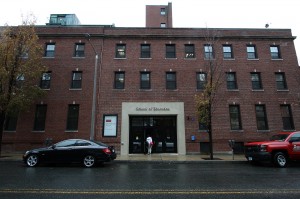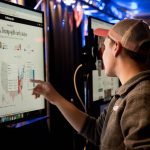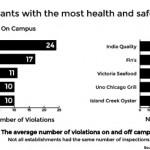
Researchers at Boston University’s School of Education are working on their partnership with city innovation experts and policy makers to create a program that will prepare students for college and the working world.
A $1 million, three-year grant awarded by the U.S. Department of Education’s Institute of Educational Sciences in May funded the creation of the Massachusetts Institute for College and Career Readiness, a program housed within SED uniting researchers, policy makers and community leaders to tackle student issues.
“We’re doing something that not only has value for the community, but we’re doing it in a way that’s going to add value to the science in terms of study and implementation,” said V. Scott Solberg, SED’s associate dean for research. “It brings out the best of both aspects of BU: the research as well as community engagement.”
At the high school level, MICCR will look into early warning predictors, work with lower performing schools and create individualized learning plans to help students prepare for college and their careers, Solberg said.
“The bigger issue is if the workforce has skills and employability,” he said. “We want to build student capacity to enter these industries and see college as a pathway to a living wage, sustainability, and doing something they enjoy.”
MICCR began in July, and used the summer to hone the program before its full launch, Solberg said.
Thomas Brock, commissioner of IES’s National Center of Education Research, said BU received funding through a process of applying for a competitive grant for community and research partnerships.
“Not a lot of research has been done to look at policies and programs that might lead to higher levels of college persistence or attainment, but more work is being done every year,” he said. “Part of our hope with this new institute that it will not only do a good job of surveying the research, but also staying on top of emerging research and bring that to the table.”
Emily Murphy, director of programs at MICCR partner organization the Rennie Center for Education Research and Policy, said focusing on college and career readiness was a critical student issue.
“MICCR is a collaborative teaching effort to build their capacity and the ability to achieve and important outcome,” she said. “It’s important to think of college and career not as an either or and not an end in itself…especially because we’re trying to bridge the gap between research and implications and really build district capacity to use their data more effectively, Boston University is the perfect partner.”
Benjamin Forman, director at MICCR partner MassInc Gateway Cities Innovation Institute, said collaboration with SED and Solbert is essential to support the community.
“We collaborate with BU to do that because there wasn’t really anybody who had the sophistication to work with a federal grant like this,” he said. “If it weren’t for Scott and his ability to navigate that territory we wouldn’t have that resource for cities today. The research expertise that they’ll bring is really important and beneficial to give cities what they deserve. If it weren’t for them, we wouldn’t be doing this today.”
Dean of SED Hardin Coleman said he is pleased to see the MICCR to improve the practice of education and produce meaningful and useful research.
“If we are going to close the opportunity gap between economic groups and prepare students for the world of work, we have to know more about how to work with youth and their schools to help create and implement effective programs for helping students to become college and career ready,” he said in an email. “We need institutions that bring together scholars and practitioners.”
Vice Chairman and archives keeper for The Daily Free Press Board of Directors. Former news editor. I like data, politics, and higher education, but will write about anything.














